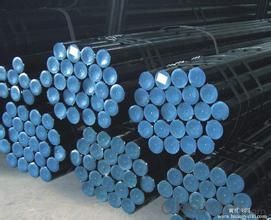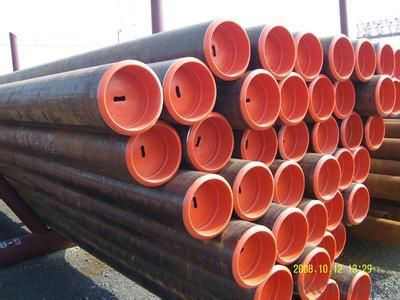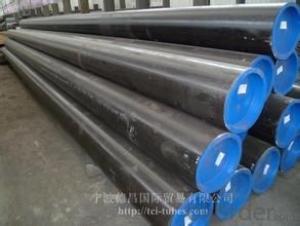Seamless steel tubes for the United States standards
- Loading Port:
- China main port
- Payment Terms:
- TT OR LC
- Min Order Qty:
- 40 m.t.
- Supply Capability:
- 9000 m.t./month
OKorder Service Pledge
OKorder Financial Service
You Might Also Like
1、Structure of Seamless steel tubes for the United States standards
Seamless steel pipe has a hollow section, a large number of pipes used for conveying fluid, such as oil, natural gas, gas, water and some solid materials, etc Seamless pipe is formed by drawing a solid billet over a piercing rod to create the hollow shell.
2、Main Features of Seamless steel tubes for the United States standards
• High manufacturing accuracy
• High strength
• Small inertia resistance
• Strong heat dissipation ability
• Good visual effect
• Reasonable price
3、 Seamless pipe of various materials Specification:
Standard | GB, DIN, ASTM ASTM A106-2006, ASTM A53-2007 |
Grade | 10#-45#, 16Mn 10#, 20#, 45#, 16Mn |
Thickness | 8 - 33 mm |
Section Shape | Round |
Outer Diameter | 133 - 219 mm |
Place of Origin | Shandong, China (Mainland) |
Secondary Or Not | Non-secondary |
Application | Hydraulic Pipe |
Technique | Cold Drawn |
Certification | API |
Surface Treatment | factory state or painted black |
Special Pipe | API Pipe |
Alloy Or Not | Non-alloy |
Length | 5-12M |
Outer Diameter | 21.3-610mm |
Grade | 20#, 45#, Q345, API J55, API K55, API L80, API N80, API P110, A53B |
Standard | ASME, ASTM |
1) Material:20#(ASTM A 106/A53 GRB.API5LGRB,GB),45#,16Mn,10#.
2) Specification range:OD:21.3-610mm,WT:6-70mm,length:6-12m or according to the requirement of clients.
3) Excutive standards:GB,ASME API5L.ASTM A 106/A53,Despite of the above standards,we can also supply seamless steel pipe with standard of DIN,JIS,and so on,and also develop new products according to the requirements of our clients!
4) Surface:black lacquered,varnish coating or galvanized.
5) Ends:Beveled or square cut,plastic capped,painted.
6) Packing:bundles wrapped with strong steel strip,seaworthy packing.
4、Packaging & Delivery
Packaging Details: | seaworthy package,bundles wrapped with strong steel strip |
Delivery Detail: | 15-30days after received 30%TT |
5、FAQ of Seamless steel tubes for the United States standards
①How is the quality of your products?
Our products are manufactured strictly according to national and internaional standard, and we take a test
on every pipe before delivered out. If you want see our quality certifications and all kinds of testing report, please just ask us for it.
Guaranteed: If products’ quality don’t accord to discription as we give or the promise before you place order, we promise 100% refund.
②How about price?
Yes, we are factory and be able to give you lowest price below market one, and we have a policy that “ for saving time and absolutely honest business attitude, we quote as lowest as possible for any customer, and discount can be given according to quantity”,if you like bargain and factory price is not low enough as you think, just don’t waste your time.
③Why should you chose us?
Chose happens because of quality, then price, We can give you both.Additionally, we can also offer professional products inquiry, products knowledge train(for agents), smooth goods delivery, exellent customer solution proposals.
6、 Seamless pipe of various materials Images:


- Q:What is the maximum temperature and pressure that steel pipes can withstand?
- The maximum temperature and pressure that steel pipes can withstand vary depending on the specific grade and type of steel being used. However, in general, steel pipes can withstand high temperatures and pressures due to their strong and durable nature. For high-temperature applications, such as in steam or heat transfer systems, steel pipes can typically withstand temperatures up to 1000 degrees Celsius (1832 degrees Fahrenheit) or even higher. It is important to note that the specific temperature limit may vary depending on the alloy composition and heat treatment of the steel. Regarding pressure, steel pipes are known for their excellent strength and resistance to internal and external pressure. The maximum pressure that steel pipes can withstand will depend on factors such as the pipe diameter, wall thickness, and material strength. In industrial applications, steel pipes can withstand pressures ranging from a few hundred psi (pounds per square inch) to several thousand psi. To ensure the safe operation of steel pipes under high temperatures and pressures, it is crucial to follow industry standards and guidelines, as well as perform regular inspections and maintenance. Consulting with engineers and professionals experienced in steel pipe systems can provide more specific information regarding the maximum temperature and pressure limits for a particular steel pipe application.
- Q:What are the different coating materials used for steel pipes?
- There are several different coating materials used for steel pipes, including epoxy, polyethylene, polyurethane, and zinc. These coatings are applied to the exterior of the pipes to provide protection against corrosion, abrasion, and other environmental factors. Each coating material has its own specific characteristics and is chosen based on the intended application and the level of protection required.
- Q:Can steel pipes be used for LNG terminals?
- Yes, steel pipes can be used for LNG terminals. Steel pipes are commonly used in LNG terminals for transporting and distributing liquefied natural gas due to their strength, durability, and ability to withstand extreme temperatures and pressures. Additionally, steel pipes can be easily welded and have excellent corrosion resistance, making them suitable for the transportation and storage of LNG.
- Q:What are the applications of steel pipes?
- Steel pipes have a wide range of applications in various industries due to their durability, strength, and versatility. Some of the common applications of steel pipes include: 1. Plumbing and water distribution: Steel pipes are commonly used in plumbing systems to transport water and other fluids. They are resistant to corrosion and can withstand high pressure, making them ideal for water distribution networks in residential, commercial, and industrial buildings. 2. Oil and gas industry: Steel pipes are extensively used in the oil and gas industry for the transportation of oil, natural gas, and other petroleum products. They are able to handle high-pressure and high-temperature environments, making them crucial in drilling, production, and refining processes. 3. Construction and infrastructure: Steel pipes are widely employed in construction projects for various purposes such as structural support, foundations, scaffolding, and underground piping systems. They provide a strong and reliable framework for buildings, bridges, tunnels, and highways. 4. Industrial applications: Steel pipes are used in various industrial applications such as manufacturing, power plants, chemical processing, and food processing. They are often used to transport liquids, gases, or slurries within the production processes or to transfer heat in heat exchangers and condensers. 5. Agricultural sector: Steel pipes are commonly used in the agricultural sector for irrigation systems, particularly in large-scale farming. They are used to transport water from a water source to the fields, ensuring efficient and controlled water distribution. 6. Mining industry: Steel pipes are utilized in the mining industry for the extraction and transportation of minerals, ores, and other mining materials. They are resistant to abrasion and corrosion, making them suitable for the harsh and demanding conditions of mining operations. 7. Mechanical and automotive applications: Steel pipes find application in the manufacturing of various mechanical components, such as automotive exhaust systems, hydraulic cylinders, and precision tubing. They offer high strength, dimensional stability, and resistance to impact and vibration. 8. Infrastructure and utilities: Steel pipes are commonly used in infrastructure projects for the transportation of sewage, stormwater, and wastewater. They are durable, resistant to chemical corrosion, and can withstand underground conditions, making them suitable for sewer and drainage systems. In summary, the applications of steel pipes are vast and diverse, ranging from plumbing and water distribution to oil and gas industry, construction, agriculture, mining, mechanical and automotive sectors, and infrastructure projects. Their robustness, versatility, and ability to withstand extreme conditions make them a fundamental component in numerous industries.
- Q:What does "SC50" steel pipe mean in civil engineering?
- SC50: laying on welded steel tubes of diameter 50mm. SC is usually used in electrical installation drawings.
- Q:How do steel pipes perform in corrosive environments?
- Steel pipes perform well in corrosive environments due to their natural corrosion resistance. The addition of protective coatings or linings further enhances their performance, making them highly durable and suitable for a wide range of applications in such environments.
- Q:What are the common grades of steel used in pipes?
- The common grades of steel used in pipes include carbon steel, stainless steel, and alloy steel.
- Q:Can steel pipes be used for underground fire protection systems?
- Yes, steel pipes can be used for underground fire protection systems. Steel pipes are commonly used in underground applications due to their durability, strength, and resistance to corrosion. They provide an effective means of delivering water for fire suppression in underground areas, ensuring the safety of the surrounding infrastructure.
- Q:How are steel pipes used in the construction of solar power plants?
- Steel pipes are used in the construction of solar power plants for various purposes, including the installation of solar panels, mounting structures, and the transportation of fluids such as water and steam within the plant. These pipes provide strength, durability, and corrosion resistance, making them an essential component in the construction and operation of solar power plants.
- Q:How much is 4 inches steel tube MM?
- Seamless root weight per meter: 1 mm (diameter - thickness) * wall thickness of *0.02466*1 meters is? Normal KG/M pipe length 8-11rice
1. Manufacturer Overview |
|
|---|---|
| Location | |
| Year Established | |
| Annual Output Value | |
| Main Markets | |
| Company Certifications | |
2. Manufacturer Certificates |
|
|---|---|
| a) Certification Name | |
| Range | |
| Reference | |
| Validity Period | |
3. Manufacturer Capability |
|
|---|---|
| a)Trade Capacity | |
| Nearest Port | |
| Export Percentage | |
| No.of Employees in Trade Department | |
| Language Spoken: | |
| b)Factory Information | |
| Factory Size: | |
| No. of Production Lines | |
| Contract Manufacturing | |
| Product Price Range | |
Send your message to us
Seamless steel tubes for the United States standards
- Loading Port:
- China main port
- Payment Terms:
- TT OR LC
- Min Order Qty:
- 40 m.t.
- Supply Capability:
- 9000 m.t./month
OKorder Service Pledge
OKorder Financial Service
Similar products
New products
Hot products
Related keywords






























